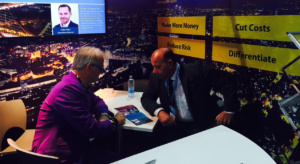4 Ways in Which AI is Transforming Fintech
AI applications can process huge datasets and execute low-level automated tasks. As a result, they’re increasingly finding their way into different business applications. The financial sector is perfectly suited for AI adoption, thanks to its wide variety of data sets and the need for intelligent automation.

Fintech firms have been at the forefront of AI adoption, and their impact is being felt in different areas of the financial sector. While some of these tasks involve routine automation, others are truly revolutionary.
Here are 4 ways in which AI-assisted platforms are transforming fintech.
1. Credit Analysis and Process Automation
Small businesses and individuals need loans from time to time to keep their financial lives moving forward. Traditionally, these entities would approach a bank, fill out an application form, and then hope they would be approved.
The loan underwriting process at a bank involves checking the applicant’s creditworthiness. Typically, credit scores are checked, along with any glaring red flags such as bankruptcy filings and so on. While this process helps banks avoid risks that might affect their business, the problem is that they end up lending money to people who don’t need it urgently.
As a result, large parts of the population such as students, people with poor credit, the elderly, and new small businesses are left out. Fintech platforms have used AI to rethink the loan approval process by taking a wider variety of data into account.
These days, big banks are incorporating these models into their systems as well. For instance, Zest develops AI and ML algorithms that help banks avoid building biased credit-scoring models that would unfairly exclude a person because of race or other perceived risks.
Thanks to these sophisticated models, banks can approve loans to a larger audience, earn more money, and assist a greater portion of people who apply.
2. Accessible Fintech Sites
From digital banking to cryptocurrency trading, online financial service platforms are thriving. Many people are used to managing their money online now, however; these services need to legally be available to everyone. If a website is inaccessible, then those with disabilities are unable to use these services. Recently, financial website Morgan Stanley was sued by a blind woman because the site was inaccessible. And they aren’t alone. In 2020 alone, app and video accessibility increased by almost 25%.
AI-powered accessibility solutions such as accessiBe have become extremely popular. The company’s AI-driven algorithm analyzes the various elements on a webpage and adjusts them to be accessible. Every 24 hours, accessiBe’s AI technology scans for new and revised content to fix. They ensure ADA and WCAG compliance, so the threat of ADA lawsuits is a thing of the past for other fintech sites.
3. Fraud Detection
Fraud is an ever-present concern for the financial sector. As fintechs expanded into providing services, they discovered the reason traditional banks have huge compliance and risk departments. The propensity for fraud, especially credit card-related fraud, is high.
Their solution has been to automate a lot of fraud detection processes and involve human intervention in certain cases. As a result, AI analyzes the mountains of usage and spending data that these companies gather on their customers and flags suspicious spending patterns.
Any patterns that are within the algorithm’s confidence limits are instantly flagged, and card owners are alerted. If a pattern falls outside the confidence band, the problem is escalated to a human employee who can make a subjective decision. Thus, customers are fully protected from all instances of fraud.
Money laundering is a concern for banks and typically involves higher monetary amounts. The complex network of relationships between individuals and offshore companies and bank accounts makes it impossible for a person to manually evaluate each transaction. AI is best equipped to flag such suspicious activity and alert relevant compliance employees.
An example of a platform that is used by both commercial and investment banks is milize. The Japanese fintech claims to detect fraudulent activity with a 90% confidence limit and is changing the way banks execute fraud prevention protocols.
4. Predictive Market Analysis
Investment banks are complex organizations, and a large portion of their income is derived from trading their books in the markets. These days, equity desks at banks are staffed almost entirely by machines, with human beings non-existent in traditional market-making positions.
In the derivative markets, where prices are opaque and conditions unpredictable, AI-driven quantitative models help traders limit risk and assume positions efficiently.
It isn’t just trading, predictive analytics are also useful in presenting clients with reports on what the markets might look like at some point down the road. This helps banks propose the best products for their clients and increase their bottom lines.
A Promising Partnership
AI is just getting started, and the day isn’t far off when every facet of the financial sector will be influenced by it in one way or another. As technology improves by leaps and bounds, the future of fintech is more exciting than ever before.









